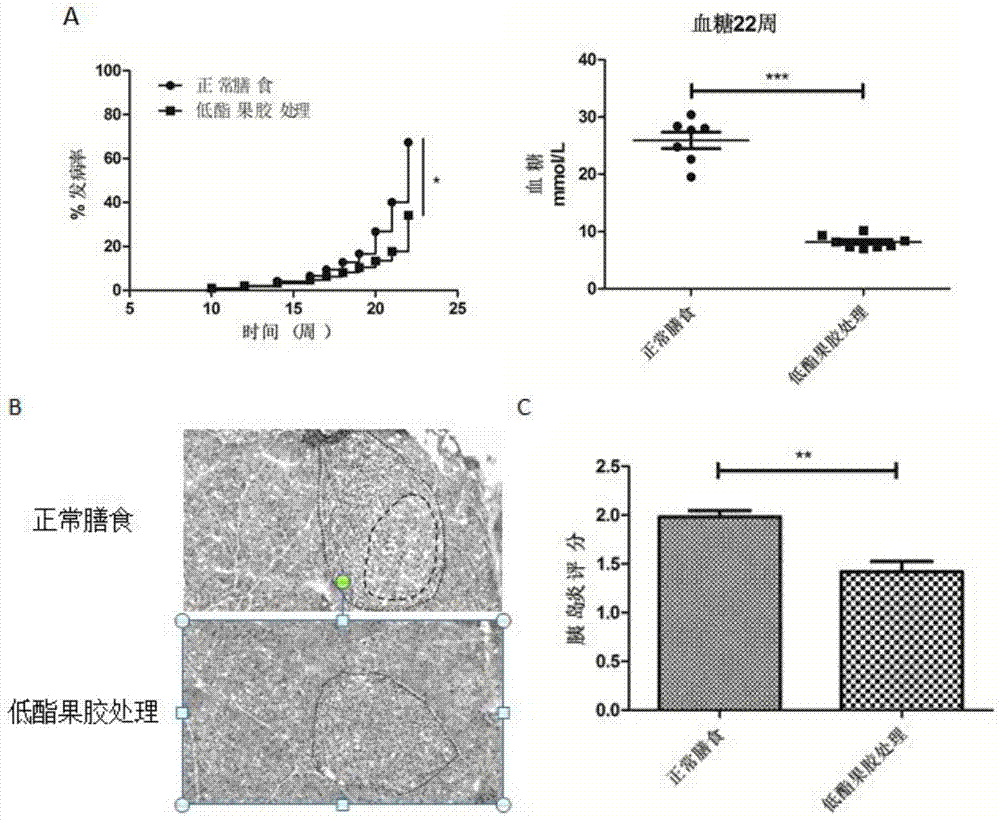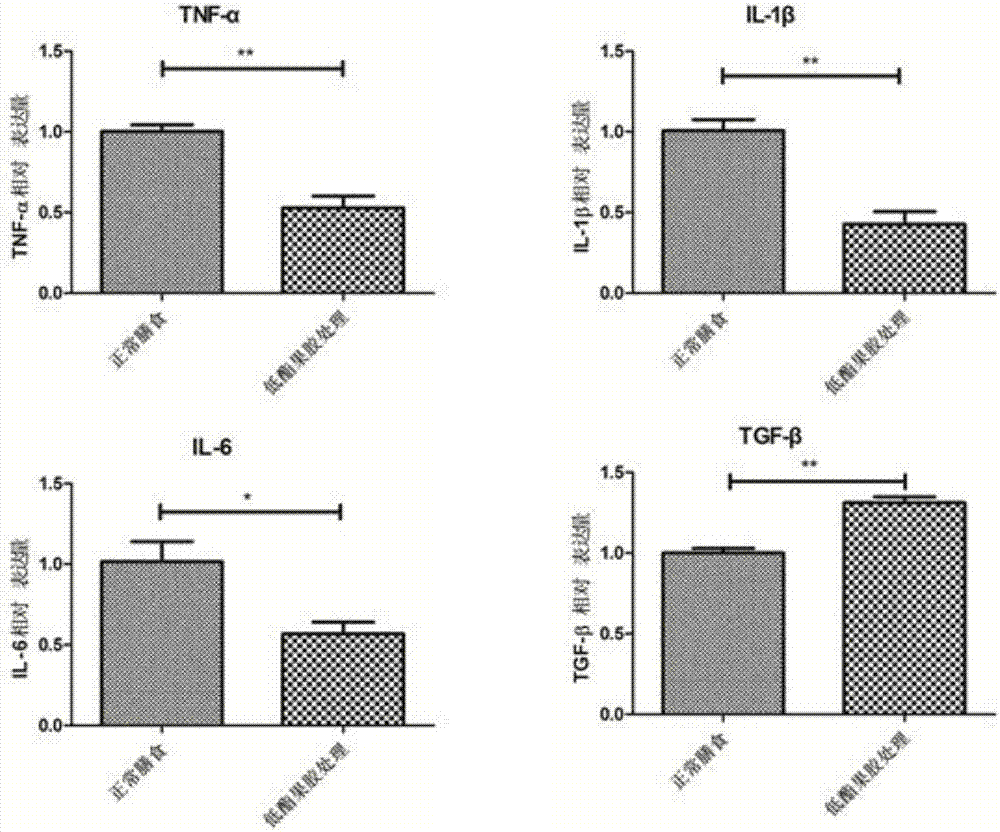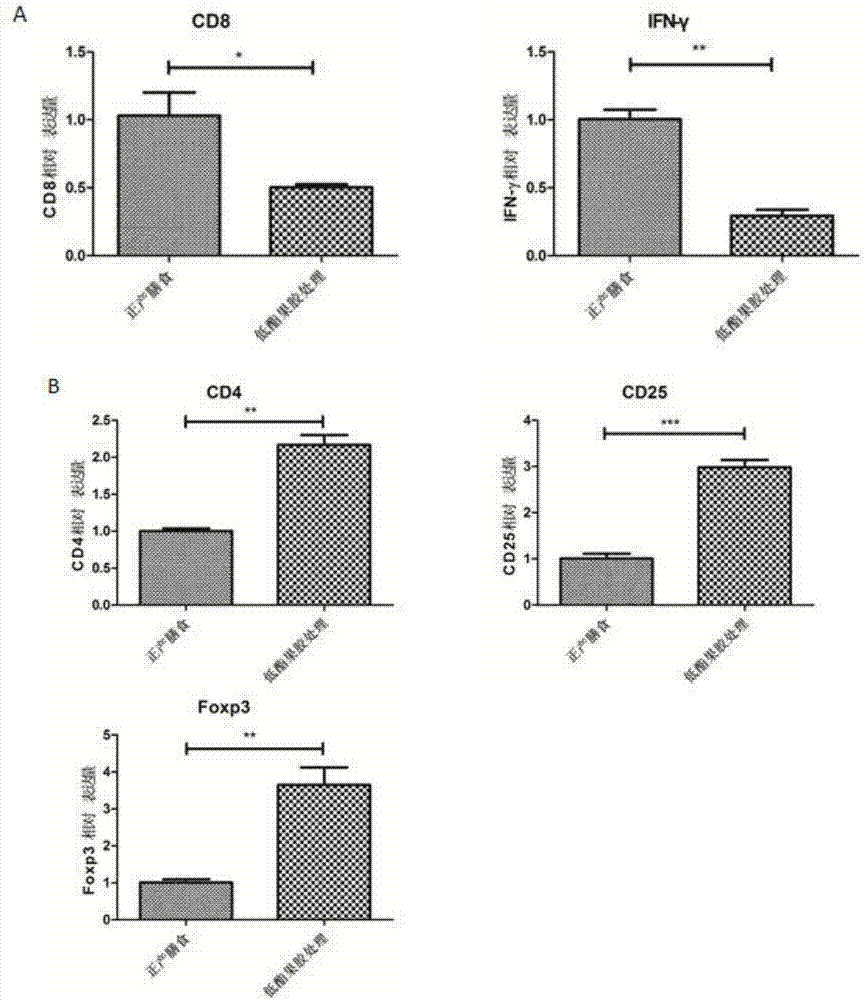Applications of low methoxyl pectin in preventing and controlling, or auxiliary treatment of diabetes
A technology of low-ester pectin and adjuvant therapy, which is applied in the fields of application, medical preparations containing active ingredients, metabolic diseases, etc., and can solve problems such as poor insulin effect, insulin deficiency, and health hazards of diabetic patients
- Summary
- Abstract
- Description
- Claims
- Application Information
AI Technical Summary
Problems solved by technology
Method used
Image
Examples
Embodiment 1
[0037] Embodiment 1. Low-ester pectin reduces blood sugar and morbidity in NOD mice
[0038] The female NOD mice were equally divided into two groups, one group was fed with normal diet, and the other group was fed with 5% (low-ester pectin mass g / total weight g of feed, low-ester pectin was obtained from the University of Groningen in the Netherlands) De Vos, Paul's low-ester pectin with a degree of esterification of 7) was fed with low-ester pectin feed. Blood glucose was measured in two groups of NOD mice from the tenth week. The specific operation is to fast the mouse for 12 hours, insert the Roche Vitality Blood Glucose Test Paper into the corresponding blood glucose meter, and when the blood sample is dripped, drop the capillary blood sample from the tail of the mouse on the test paper, wait for 5 seconds, and read Take the blood sugar value. When the blood glucose value was greater than 14.4mmol / L, it was defined as the diseased mice. The incidence rate of mice was c...
Embodiment 2
[0039] Example 2. Low-ester pectin significantly reduces the immune infiltration of islet cells in NOD mice
[0040] Using HE staining method, the pancreas of the normal diet group and the low-ester pectin treatment group were fixed, dehydrated, stained, dewaxed, cleared and mounted, and the infiltration of islet inflammatory cells was observed. Such as figure 1 B, The results show that the normal diet group has obvious inflammatory infiltration, while the low-ester pectin treatment group has a significant improvement effect, and the insulitis score of multiple islets in the same group is found to be significantly higher in the normal diet group than the low-ester pectin treatment Group. Insulitis grading principles: 0 for no islet inflammation, 1 for slight infiltration, 2 for less than 50% infiltration, 3 for more than 50% infiltration figure 1 B and C).
Embodiment 3
[0041] Example 3. Low-ester pectin significantly reduces the expression of pro-inflammatory factors in the pancreas of NOD mice
[0042] In NOD mice, TNF-α, IL-1β and IL-6 are pro-inflammatory factors. Before the onset of the disease, the level of inflammation in NOD mice was already higher than that of C57 and other strains of the same age. During the onset of NOD mice, inflammatory factors were released violently and the synergistic stimulation among the three aggravated the inflammation level of NOD mice.
[0043] The qPCR method was used to quantify the pro-inflammatory factors. First, the mouse pancreas tissue was ground into powder in liquid nitrogen, the powder was transferred to Trizol and mixed vigorously, chloroform was added to shake vigorously, and the supernatant was obtained after high-speed centrifugation. Add an equal volume of isopropanol to precipitate the RNA in the supernatant, centrifuge at high speed, wash the RNA once with 75% ethanol, dissolve the RNA ...
PUM
 Login to View More
Login to View More Abstract
Description
Claims
Application Information
 Login to View More
Login to View More - R&D
- Intellectual Property
- Life Sciences
- Materials
- Tech Scout
- Unparalleled Data Quality
- Higher Quality Content
- 60% Fewer Hallucinations
Browse by: Latest US Patents, China's latest patents, Technical Efficacy Thesaurus, Application Domain, Technology Topic, Popular Technical Reports.
© 2025 PatSnap. All rights reserved.Legal|Privacy policy|Modern Slavery Act Transparency Statement|Sitemap|About US| Contact US: help@patsnap.com



